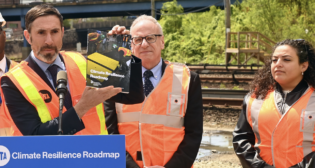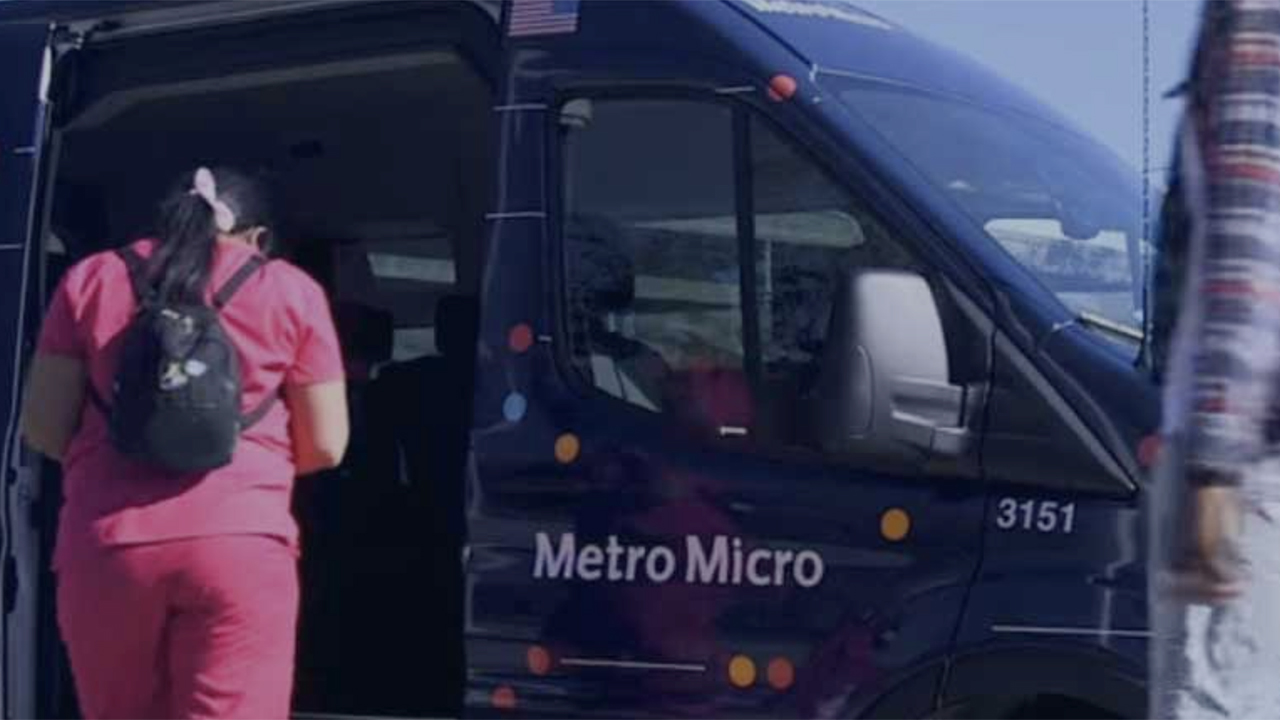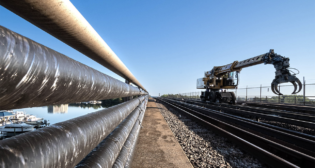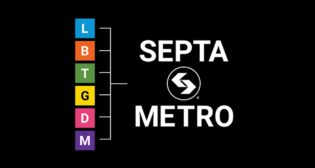
Transit Briefs: LACMTA, Metrolink, NORTA, TTC
Written by Marybeth Luczak, Executive Editor
LACMTA’s Metro Micro, its on-demand rideshare service, has provided more than 1.7 million rides to date. (LACMTA Photograph)
Los Angeles County Metropolitan Transportation Authority (LACMTA) is implementing a permanent fare structure for its first/last-mile service. Also, Southern California’s Metrolink resumes the Angels Express after a four-year hiatus; New Orleans Regional Transit Authority (NORTA) is working to restore the Rampart Streetcar Line; and Toronto Transit Commission (TTC) launches an enhanced fare compliance campaign.
LACMTA
Beginning March 24, LACMTA will implement a permanent fare structure for its on-demand rideshare service, Metro Micro. The aim is to better integrate Metro Micro within its existing bus and rail system. Standard fares will rise from $1 to $2.50 per ride, and LACMTA will introduce special discounts for riders enrolled in LIFE, GoPass, and a range of other programs to ensure that Metro Micro is accessible to those who need it most.
LACMTA in December 2020 launched Metro Micro as a three-year pilot. Instead of operating vehicles on a fixed schedule and route, the service matches riders with flexible pick-up and drop-off locations and times to board smaller vehicles that seat up to nine passengers. Riders can order a Metro Micro van with a smartphone app or by placing a phone call or using book.metro-micro.net. According to LACMTA, the goals have been threefold:
- “Improving first/last mile connections to existing transit routes.
- “Providing better service where fixed routes are performing poorly.
- “Addressing inequities in the availability and affordability of on-demand ride-hailing services in low-income areas.”
Metro Micro rides are also recognized for transfers to and from 23 partner transit agencies based on each one’s existing interagency transfer agreements and the fees applicable for transfers with existing LACMTA bus and rail services.
Micro Metro started with an introductory $1 fare, partly to promote the program and partly in recognition of the economic impact COVID-19 had on riders. The $1 fare was planned to continue for the first six months of the program. However, impacts from the COVID-19 pandemic caused the transit agency to extend the rate.
“Now, with pandemic-era travel restrictions behind us, and with the pilot program having been extended in September 2023, we’re implementing a new fare structure,” LACMATA reported. “Our new permanent Metro Micro fare structure allows us to continue offering this important service while still providing discounts to people who need them most. It also makes it easier to use our entire system by transferring between Metro Micro and other modes. We’re proud of how far we’ve come––to date, Metro Micro has provided over 1.7 million rides––and we see these changes as important steps toward providing a more sustainable and integrated service.”
In other LACMTA news, Hyundai Rotem recently beat rival Stadler to supply 182 HR5000 cars. The manufacturer will deliver two-car trains—each with a capacity of 245 passengers—designed to enable up to three trains to run in multiple. They will operate on LACMTA’s B (Red) Line, which runs for 16.4 miles between downtown LA and northern Hollywood, and the D (Purple) Line, which runs between downtown LA and Koreatown (6.4 miles).
Metrolink

For the first time since the 2019 Major League Baseball season, Los Angeles Angels fans will be able to take Metrolink to select home games, the regional/commuter railroad reported March 21. Metrolink’s Angels Express service is returning on the Orange County (OC) and Inland Empire-Orange County (IEOC) lines for 42 games this season, including all regularly scheduled Friday, Saturday and Sunday Angels home games, and all three matchups with the crosstown Los Angeles Dodgers at Angel Stadium in 2024, including a preseason game on March 26. The Angels’ regular season begins April 5 against the Boston Red Sox with Angels Express trains running throughout opening weekend.
Adult roundtrip tickets are $10 per person, while up to three kids ages 17 and under can ride free with each paying adult.
Metrolink’s Anaheim stop at the Anaheim Regional Transportation Intermodal Center (ARTIC) is adjacent to Angel Stadium, allowing for a short walk to the ballpark. For the first time, Angels Express service on the IEOC Line, which will originate at the Riverside-Downtown Station, will take passengers directly to Anaheim without requiring a transfer to an OC Line train. Angels Express service on the OC Line will operate from LA Union Station and Oceanside to Anaheim.
The Angels Express service is funded by Metrolink member agencies the Orange County Transportation Authority (OCTA), LACMTA and Riverside County Transportation Commission (RCTC).
“We’re thrilled to announce the long-awaited return of our Angels Express service for the 2024 season,” Metrolink CEO Darren Kettle said. “As two of America’s great pastimes, taking the train and baseball go hand in hand, and we look forward to once again connecting Southern Californians with the sights and sounds of the ballpark—and the memories made there.”
Separately, Metrolink recently extended its fare-free pilot program for students.
NORTA
NORTA has conducted a “pull test” on the Rampart Streetcar Line in anticipation of its reopening by May 31, according to WNGO ABC of New Orleans, La. The line has been out of service since 2019, when the Hard Rock Hotel collapsed while under construction.
NORTA crews on March 21 “pulled an out-of-service streetcar across South Liberty and Canal streets testing out the tracks,” WNGO ABC reported. “This was the first of many tests planned to ensure the tracks safety and security.”
In November 2023, repairs began to damaged poles adjacent to the Hard Rock Hotel site, according to NORTA, and crews worked to restore the catenary. Construction work began in February 2024, and was expected to continue through this month, followed by six weeks of training and testing.
Further Reading: New Orleans Celebrates Streetcar Centennial
TTC
TTC on March 21 reported rolling out a new campaign “reminding everyone about the importance of paying fares, and warning those who steal rides that they are subject to fines.”
The new campaign contains a variety of messages, focusing on the importance and benefits of paying proper fares while also reminding those who face financial difficulties about the city of Toronto’s Fair Pass program. As well, riders are seeing increased fare inspection activity and more staff at locations known to be prone to fare evasion, according to TTC. Transit Fare Inspectors will be patrolling the downtown streetcar network and transfer points in stations, and there will be an increased presence of supervisors and Special Constables on the bus network. These measures not only deter fare evasion, but also help make the TTC safer through increased visibility of staff, TTC noted.
TTC’s campaign comes as a new internal audit report (above) shows fare evasion at an all-time high, the agency said. TTC’s auditors found that in 2023, fare evasion was at almost 12% and cost the system close to C$124 million in lost revenue. Those numbers are almost double the 2018 review that placed evasion at around 6%, costing TTC C$60 million-C$70 million per year.
Over the past several months, TTC has increased staffing for both fare compliance and improved safety and security, it reported. This includes hiring fare inspectors, special constables, and 130 new stations staff “who will be present at secondary entrances to address the issue of gate crashing and assist customers as needed,” according to the transit agency.
TTC said it also introduced a new fare collection process that “ensures customers are treated with respect and provides enhanced accountability, including the creation of a complaints office.”
TTC said that staff members will report back at the May Board meeting on responsive enforcement plans and the impact the new measures have had since the auditor’s study.
Meanwhile, three of Canada’s biggest transit agencies, including TTC, are urging the federal government to advance the next wave of transit funding. Also, TTC recently released a Request for Proposals for the Bloor-Yonge Capacity Improvements project.



